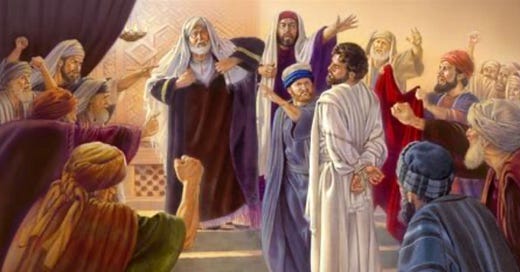I didn’t grow up with any religious traditions so to me Easter was not as important as Christmas. After all, at Christmas we got some nice stuff.
At Easter it was hollowed out chocolate eggs.
So I understand that most people don’t go out of their way to celebrate Easter too much except, perhaps, to have a meal with family and friends (still, nothing like Thanksgiving and Christmas in the memories of my childhood days).
But it isn’t all bad to come awake to the meaning of Christmas and Easter as they relate to Jesus the Messiah and Son of God because the real story as recounted in Scripture is much deeper, more nuanced, and perpetually practical than I could at first imagine.
In other words, I’m still annually uncovering more to the story.
This time around I am seeing in the statements of the High Priest and other Pharisees something quite remarkable but generally overlooked.
It seems to me that every word they uttered throughout the gospels were fulfillments of prophecy.
They weren’t lying blatantly — which means there are something deeper truths in what they were saying.
As an example of what I’m attempting to point out, let’s look at the plot to kill Jesus as found in the following passage from John’s gospel.
So the chief priests and the Pharisees gathered the council and said, “What are we to do? For this man performs many signs. If we let him go on like this, everyone will believe in him, and the Romans will come and take away both our place and our nation.”
But one of them, Caiaphas, who was high priest that year, said to them, “You know nothing at all.
Nor do you understand that it is better for you that one man should die for the people, not that the whole nation should perish.”
He did not say this of his own accord, but being high priest that year he prophesied that Jesus would die for the nation, and not for the nation only, but also to gather into one the children of God who are scattered abroad.
So from that day on they made plans to put him to death.
John 11:47-53 (ESV)
The Pharisees and the High Priest—particularly Caiaphas—justified their plot against Jesus by arguing that his death would prevent greater disaster for Israel.
This statement, is politically quite pragmatic and sadly common to the thinking of many politicians and leaders today. At one level it seems wise and yet it is both the twisting of deeper moral laws mankind has known for millennia.
On the surface, their reasoning seems grounded in the volatile reality of Roman-occupied Judea. Jesus’ growing influence, through his teachings and miracles, risked being seen by the Romans as a revolutionary threat.
Given Rome’s brutal record of quashing dissent—as later seen in the Jewish-Roman War (66–70 CE) and the destruction of Jerusalem—the religious leaders believed that eliminating Jesus would prevent a larger crisis.
Ironically, to come to this conclusion they had to discount everything their eyes had witnessed up to that point. They were not kept in the dark when it came to Jesus’s very public ministry.
But there was more to their words than even they could understand at the time.
God was using them, including their dark hearts, for his own purposes.
As John 11:51–52 explains, Caiaphas unwittingly spoke prophetically: Jesus would die not only for Israel but to gather and redeem all of God’s children.
The religious leaders acted out of fear they would lose their authority, status, and control over the temple system. (Recall how Jesus challenged their practices by cleansing the temple in John 2:13–16 and during the Passover week as described in the other three gospels). Their concern wasn’t justice or truth but self-preservation. They manipulated the law, sought false witnesses (Matthew 26:59–60), and conspired with Roman authorities—all to silence a perceived threat.
Their justification masked deeper motives: envy, fear, and the desire to maintain power. By framing Jesus’ death as a necessary sacrifice for the nation, they cloaked their betrayal in the language of political necessity, distorting justice for personal and institutional gain.
It sounds like I plucked this story right out of today’s headlines doesn’t it?
Thanks for reading my reflections.



